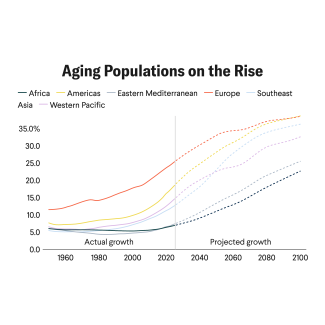The challenges Pacific Island health-care systems face is underrecognized by U.S. policymakers. The Pacific Health Care Initiative (PHCI), introduced by Congresspersons Amata Radewagen, Neal Dunn, and Ed Case in August 2023 could change that.
The Pacific Health Care Initiative calls for extending full medical benefits to veterans from the Freely Associated States, establishing a Veterans Affairs medical center in the Pacific Islands, and for a wider Pacific Island health system partnership program that addresses what they need to improve care. Health-care systems in Pacific Island countries are dealing not only with extreme weather events and geopolitical drivers in the region but also with the triple threat of rapidly rising noncommunicable diseases such as diabetes and heart disease, emerging and endemic infectious diseases, and increasing rates of injuries and accidents.
Many health-care professionals, doctors, nurses, and technicians working in Pacific Island countries do so in relative isolation, separated by hundreds of miles of sea. They provide care to what the unacquainted could label as "insignificant" small populations spread out across atolls and line islands. The collective population in the Pacific Islands (excluding Australian and New Zealand), however, is 13.9 million people living on thousands of islands spread out over 30 percent of the Earth's surface. They deserve access to equitable health care.
13.9 million people living on thousands of islands spread out over 30 percent of the Earth's surface, deserve access to equitable health care
The challenges are not just illnesses and injuries—they also involve establishing ways people can access care, the type of baseline care available, and where patients can be referred and how to get them there should they need advanced care.
Dudley Baerodo, a surgeon working in Honiara, Solomon Islands, knows this all too well. His niece had rheumatic heart disease that went undertreated due to inability to access cardiac surgical care. She died at age 30 in October 2023. Three months later, Baerodo lost a 21-year-old nephew to the same condition. Even if screening programs become regular, without access to treatment children and young adults will continue to die. Cardiac surgical care is not available in Solomon Islands, home to a population similar in size to that of Washington, DC.
Although volunteer groups such as Open Heart International visit Fiji and Papua New Guinea annually, referring patients to those aid organizations depends on the local health ministries and governments establishing budgets to cover the travel costs of patients. Once-a-year visits mean that patients often die while waiting for their next appointments. Supporting the creation of full time, fully staffed regional hubs providing medical and surgical specialty care—such as cardiac surgery and cancer care—can reduce suffering, save lives, and eliminate travel barriers for care.

Doctors and nurses I know who work in Kiribati, the Marshall Islands, the Federated States of Micronesia, and Tuvalu want opportunities to improve their skills and establish subspecialty care as part of their armamentarium. Two-way medical educational exchanges between Pacific Island country health systems and U.S. medical universities can accomplish this while demonstrating American engagement in the region. Including regular telemedicine consultations will assist doctors and nurses working on remote islands with clinical decision-making.
The U.S. government has supported this type of medical exchange program before. The President's Emergency Plan for AIDs Relief, or PEPFAR, is the largest government-supported health initiative to date. In 2010, PEPFAR added a five-year Medical and Nursing Education Partnership Initiative (MEPI and NEPI) to address challenges in implementing PEPFAR. The program created linkages between United States and 13 sub-Saharan African medical universities. MEPI and NEPI were funded by the U.S. Department of Health and Human Services and the National Institutes of Health (NIH) at a price tag of $130 million. The programs were distinctly academic in their goals and resulted in improved medical education curriculum, reduced brain drain migration of health-care workers, and improved clinical care.
The estimated price tag would be less than half of the cost of MEPI and NEPI
The Pacific Health Care Initiative calls for a MEPI and NEPI style program in the Pacific Islands with a focus on strengthening clinical management and skills. The estimated price tag would be less than half of the cost of MEPI and NEPI.
The challenges of delivering equitable care to a diverse and dispersed population requires a bold, benevolent, and innovative approach.
The Pacific Health Care Initiative can begin to do that by delivering what the people of the Pacific Islands want while enhancing U.S. regional foreign policy.

